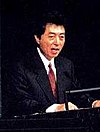Hosokawa Cabinet
| Hosokawa Cabinet | |
|---|---|
|
79th cabinet of Japan |
|

|
|
| Date formed | August 9, 1993 |
| Date dissolved | April 28, 1994 |
| People and organisations | |
| Head of government | Morihiro Hosokawa |
| Deputy head of government | Tsutomu Hata |
| Head of state | Emperor Akihito |
| Member party | JNP-JRP–JSP-Komeito–DSP-NPS-SDF Coalition |
| Status in legislature | Coalition minority |
| Opposition party | Liberal Democratic Party |
| Opposition leader | Yōhei Kōno |
| History | |
| Election(s) | 1993 general election |
| Predecessor | Miyazawa Cabinet |
| Successor | Hata Cabinet |
The Hosokawa Cabinet governed Japan from August 9, 1993, to April 28, 1994, under the leadership of Prime Minister Morihiro Hosokawa.
Formed in the aftermath of the 1993 general election, this cabinet was a broad based coalition of parties of both left (the JSP and DSP), right (JRP, JNP and NPS) and religious politics (Komeito). A series of defections had cost the LDP its majority before the 1993 election, after which all non-Communist opposition parties coalesced with the aim of creating the first non-LDP government in 38 years and achieving electoral reform. Despite the fact that the conservative Japan Renewal Party and the left-wing Japan Socialist Party were the largest parties in the coalition, Ichirō Ozawa (who negotiated the formation of the government) and his allies in the JRP pushed for Morihiro Hosokawa, a former governor of Kumamoto Prefecture and the leader of the small Japan New Party, to lead the government. Hosokwa was elected by the Diet on August 6, and took office as the first non-LDP Prime Minister for four decades. The Prime Minister himself was the only New Party member of the cabinet, which was mostly dominated by the JRP and the Socialists.
The coalition achieved Hosokawa's goal of electoral reform, replacing the previous system of multi-member districts with a combined system of single-member districts, elected by first past the post, and blocs of proportional representation candidates. But having achieved this, and replaced the LDP, the unifying purpose of the coalition was lost and ideological differences between the parties, especially over tax and defence policy, began to split the cabinet. Following revelations of a campaign finance scandal, Hosokawa announced his surprise resignation on April 8, 1994. After several weeks of negotiations, foreign minister Tsutomu Hata of the JRP became Prime Minister on April 28.
...
Wikipedia
